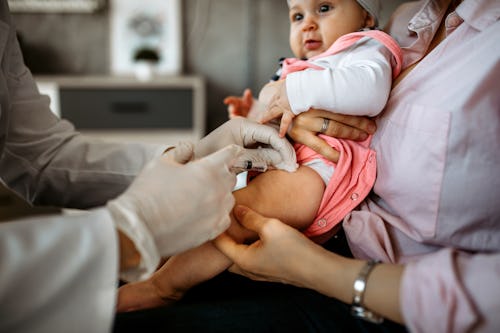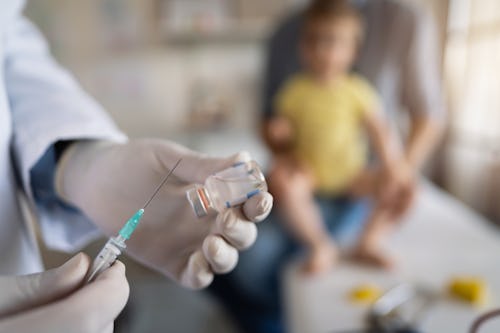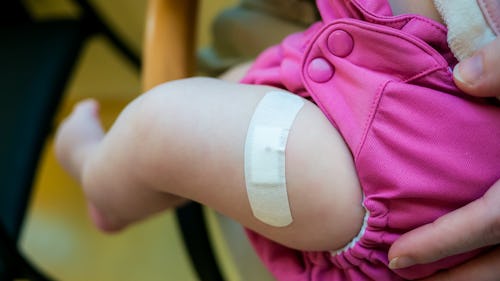
Three years after the Covid-19 pandemic began, the Centers for Disease Control and Prevention (CDC) have finally announced what seems like a permanent plan for Covid vaccines: get your initial doses, and then one updated jab each year, just like the flu shot. For most families, it’s a relief to have clear guidelines instead of constantly waiting for guidance that seems to change on a monthly (or weekly) basis. But for parents of babies and toddlers, the act of actually getting their little ones vaccinated can be nearly impossible.
Since Covid vaccines first became available to infants and toddlers in June 2022, parents have had difficulty actually finding a place to get them for kids 5 years and younger. Today, the same confluence of problems — from technicalities about who can give shots to small kids, and the way vaccines are packaged — is still preventing parents from making sure their families are protected against Covid. So, if you’ve tried to schedule an appointment for your young child’s vaccine and come up short, just know you’re not alone.
It’s surprisingly difficult to find someone to vaccinate your baby against Covid.
Logically, parents probably start their vaccine search by asking their pediatrician for the shot (since their child’s doctor is also likely making the recommendation to get it, per the CDC’s and American Academy of Pediatrics’ guidelines). But many pediatricians aren’t stocking or administering the vaccine themselves. Because they can’t afford to.

Pediatric Covid vaccines are packaged in vials, each containing multiple doses of the shot. Once they open the vial, its contents must be used within a certain amount of time or they expire. Every wasted dose not given to a child then comes out of the pediatrician’s bottom line.
“We hear from pediatricians, ‘If it's not a single dose vaccine, I can't afford to give it,’” says Dr. Michelle Fiscus, M.D., FAAP, board-certified pediatrician and chief medical officer of the Association of Immunization Managers. “You can't afford to spend $360 on a three-dose vial to vaccinate one kid and hope that you get a $120 back from the insurance company. That’s just untenable. Until there are single-dose vials available for young children, I just don’t see access getting any better.”
Pharmacists can only vaccinate children 3 years and older under the PREP Act, which overrides the usual age limits set by each state to help more families access vaccines. This, of course, leaves out little ones between 6 months and 3 years old. CVS MinuteClinics can vaccinate children as young as 18 months, but not all CVS locations have a clinic onsite, and that age limit still leaves out infants. When the PREP Act expires in December of 2024, these age limits will once again differ by state; Fiscus says in Illinois, for example, pharmacists can only vaccinate kids 7 years and older. So, finding shots may get tougher in the coming years depending on where you live.
“The pharmacies are not able to fill this gap for young kids in most cases. It really has to be the pediatricians,” says Julie Rosenberg, MPH, deputy director for the Global Health Delivery Project at Harvard University, and associate director for Better Evidence at Ariadne Labs.
Manufacturers are trying to make it easier for doctors to give vaccines.
If pediatricians are the key to getting more young children vaccinated, there may be some hope that access will improve soon. On September 19, 2023, a spokesperson for Moderna told Romper via email that now, their “Covid-19 vaccines for young children (6 months to 11 years old) are in single dose vials, whereas Pfizer’s Covid-19 vaccines are in multi-dose vials.” They have shipped their vaccines already, and they have begun arriving to pharmacies, the brand says.
This new packaging will make a huge difference in pediatricians’ ability to stock Covid vaccines, says Rosenberg, but only if the company lets pediatric providers know the one-dose vials exist. Neither expert has seen any sort of messaging about it from the company yet.
“You can have something, but if people aren’t communicating about it, then it also doesn’t change providers’ habits or desires. So if they don’t know and there hasn’t been a big push, then they still won’t do it. The message needs to be now and clear,” says Rosenberg.
Fiscus also heard rumors that Pfizer will now offer 100% refunds to pediatric providers for wasted or expired vaccines for kids 6 months to 4 years old. A Pfizer representative confirmed this to Romper via email. “This is huge and will go a long way toward getting the youngest children protected from Covid-19,” says Fiscus.
When should little ones get their Covid vaccine?

Children between 6 months and 5 years old are considered fully vaccinated once they’ve received their initial series of Pfizer or Moderna shots, and then their updated shot each year, just like they would for the flu. The updated shots for 2023 are available now, if you are able to access them in your area. The AAP says all of your child’s shots should be from the same manufacturer, if they’re between 6 months and 4 years old.
If your child just had Covid, they should wait to receive this year’s vaccine. They can get their shot three months after their Covid symptoms began (or when they tested positive for Covid, if they were asymptomatic), says Dr. Mobeen Rathore, M.D., chief of pediatric infectious disease and immunology at Wolfson Children’s Hospital of Jacksonville.
If your pediatrician isn’t offering Covid vaccines and your child is too young to be vaccinated at a pharmacy, Fiscus and Rosenberg recommend:
- Checking vaccineplanner.org. This online tool was created to improve vaccine access and display areas where doses for your age group are in stock near you. Enter your zip code, whether you drive or use public transportation, and the age of the person who needs to be vaccinated. The tool will shade the map in areas where you have to travel more than 30 minutes to find a shot, and identify possible vaccination sites accessible from those vaccine desserts.
- Asking your pediatrician where they’re sending other patients to be vaccinated.
- Calling your primary care provider to see if they can make pediatric doses available at their office.
- Getting vaccinated yourself. Babies are the pediatric population being hospitalized most often for Covid right now, Fiscus says. Having the adults around them vaccinated against Covid can help protect them from infection.
Ultimately, you might have to raise a little hell to get your child vaccinated, because no one else is doing it, according to Rosenberg. The more parents press for vaccines, the more likely doctors are to offer it. “Parents are the best advocates for their children. The more they ask for [the vaccine], the more likely they'll be able to find it. And unfortunately, it’s sort of in their hands right now. There's not a lot of other advocacy going on.”
Experts:
Dr. Michelle Fiscus, M.D., FAAP, board-certified pediatrician and chief medical officer of the Association of Immunization Managers
Julie Rosenberg, MPH, deputy director for the Global Health Delivery Project at Harvard University, and associate director for Better Evidence at Ariadne Labs
Dr. Mobeen Rathore, M.D., chief of pediatric infectious disease and immunology at Wolfson Children’s Hospital of Jacksonville
0 comments:
Post a Comment